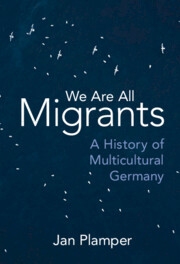
- Publisher:
- Cambridge University Press
- Online publication date:
- March 2023
- Print publication year:
- 2023
- Online ISBN:
- 9781009242264

In 2015, Germany agreed to accept a million Syrian refugees. The country had become an epicenter of global migration and one of Europe's most diverse countries. But was this influx of migration new to Germany? In this highly readable volume, Jan Plamper charts the groups and waves of post-1945 mobility to Germany. We Are All Migrants is the first narrative history of multicultural Germany told through life-stories. It explores the experiences of the 12.5 million German expellees from Eastern Europe who arrived at the end of the Second World War; the 14 million 'guest workers' from Italy and Turkey who turned West Germany into an economic powerhouse; the GDR's Vietnamese labor migrants; and the 2.3 million Germans and 230,000 Jews who came from the Soviet Union after 1987. Without minimizing racism, We Are All Migrants shows that immigration is a success story – and that Germany has been, and is, one of the most fascinating laboratories on our planet in which multiple ways of belonging, and ethnic, national, and supranational identities, are hotly debated and messily lived.
‘Jan Plamper’s book is an invitation to rethink modern German history through the lens of migration. The author is admirably attentive to the experiences and perspectives of migrants from different backgrounds. Wide-ranging and astute, We Are All Migrants is also a highly personal account. I welcome it wholeheartedly.’
Peter Gatrell - author of The Unsettling of Europe: The Great Migration, 1945 to the Present
‘A fascinating, highly original history of Germany as a largely successful multicultural saga. Beginning with the story of German emigration to the United States and Russia and moving on to discuss the many migrations to postwar Germany, Jan Plamper’s well-written and surprising book should change the way we think about Germany.’
Susan Neiman - author of Learning from the Germans: Confronting Race and the Memory of Evil
‘… opens the gates of optimism to a future of human solidarity beyond national borders, and hence it will serve students and scholars of migration studies.’
Barış Ülker Source: German Studies Review
‘Plamper’s approach has yielded a very readable and consistently engaging book. The lively translation, which the author did himself, only furthers this impression … We Are All Migrants offers a novel, wide-ranging, and lucid introduction to the history of migration in postwar Germany.’
Christopher A. Molnar Source: American Historical Review
 Loading metrics...
Loading metrics...
* Views captured on Cambridge Core between #date#. This data will be updated every 24 hours.
Usage data cannot currently be displayed.